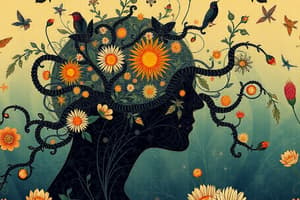Podcast
Questions and Answers
Ano ang kahulugan ng motivasyon?
Ano ang kahulugan ng motivasyon?
Ang motivasyon ay ang driving force na nag-i-initiate at nagpapanatili sa behavior ng isang indibidwal, na nakakaapekto sa direktang ginagalawan, intensyon, at pagpapasya sa isang partikular na goal o objective.
Anong mga uri ng motivasyon?
Anong mga uri ng motivasyon?
Ang mga uri ng motivasyon ay intrinsic at extrinsic.
Ano ang Maslow's Hierarchy of Needs?
Ano ang Maslow's Hierarchy of Needs?
Ang Maslow's Hierarchy of Needs ay isang teorya na nagpapakita na ang mga pangangailangan ng tao ay hierarchically organized, na may mga basic physiological needs sa base at self-actualization sa taas.
Paano nagpapataas ng motivasyon ang mga goals?
Paano nagpapataas ng motivasyon ang mga goals?
Ano ang papel ng feedback sa motivasyon?
Ano ang papel ng feedback sa motivasyon?
Paano nagpapataas ng motivasyon ang self-efficacy?
Paano nagpapataas ng motivasyon ang self-efficacy?
Flashcards are hidden until you start studying
Study Notes
Definition of Motivation
- Motivation is the driving force that initiates and sustains an individual's behavior, influencing their direction, intensity, and persistence towards a specific goal or objective.
- It is a psychological phenomenon that activates and guides an individual's behavior, helping them to overcome obstacles and achieve their desired outcomes.
Types of Motivation
- Intrinsic Motivation: Arises from within an individual, driven by personal interests, values, and desires.
- Extrinsic Motivation: Results from external factors, such as rewards, recognition, or social pressure.
Theories of Motivation
- Maslow's Hierarchy of Needs: Proposes that human needs are hierarchically organized, with basic physiological needs at the base and self-actualization at the top.
- Herzberg's Two-Factor Theory: Suggests that motivation is influenced by two factors: hygiene factors (extrinsic) and motivator factors (intrinsic).
- Self-Determination Theory: Emphasizes the importance of autonomy, competence, and relatedness in fostering intrinsic motivation.
Factors Influencing Motivation
- Goal-Setting: Specific, challenging, and attainable goals enhance motivation.
- Feedback: Regular, constructive feedback helps to maintain motivation.
- Reinforcement: Positive reinforcement, such as rewards or recognition, can boost motivation.
- Self-Efficacy: Belief in one's ability to achieve a task or goal influences motivation.
- Emotions: Emotions, such as enthusiasm, excitement, or anxiety, can drive motivation.
Motivation Strategies
- Goal-Setting: Set specific, measurable, achievable, relevant, and time-bound (SMART) goals.
- Positive Self-Talk: Encourage positive self-talk and self-affirmation.
- Breakdown Tasks: Divide tasks into smaller, manageable chunks to reduce overwhelm.
- Celebrate Progress: Recognize and celebrate progress towards goals.
- Find Meaning: Identify the purpose and significance of a task or goal to increase motivation.
Studying That Suits You
Use AI to generate personalized quizzes and flashcards to suit your learning preferences.




